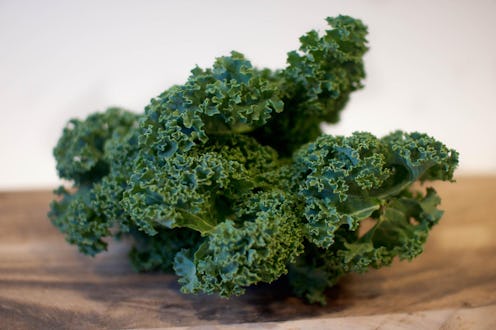Life
Eating Kale Could Actually Be Making You Sick

After a particularly exciting and vice-laden weekend filled with copious amounts of red wine and french fries, I often will elect something a little healthier come lunchtime on Monday. And what could possibly be better for a person than a large serving of the king of leafy-greens — kale? Well, as it turns out, seemingly much like every other thing consumed by human beings, eating large amounts of kale might make you sick, new research shows.
According to an article in Craftsmanship Magazine, molecular biologist Ernie Hubbard in Marin County, California has observed higher than normal levels of thallium, a toxic heavy metal, in the blood samples of his clinic's patients complaining of symptoms such as skin and hair problems, foggy thinking, and digestive sensitivities.
Hubbard cites a 2006 peer-reviewed paper by Czech researchers that states that kale and other members of the brassicas genus — such as cabbage, radishes, and turnips — are able to absorb and retain thallium from the soil. But for high levels of thallium to exist in the soil in the first place, it has to come from somewhere. High levels of thallium in the soil are found in places where waste from some of humanity's less-green activities, namely, from the ash from coal-burning power plants, finds its way. Kale's proclivity for absorbing toxins combined with Hubbard's patients' anecdotes of consuming a ridiculous amount of kale and its cousins leads Hubbard to believe that the cases of low-level thallium poisoning are actually arising from overdoing it on the brassicas.
It's a perfect example of the circle of life. Humans burn coal, creating ash that pollutes the soil with heavy metals, and then, literally, they reap what they sow as they eat the vegetables grown in contaminated soil. Excellent.
Of course, there is no evidence to suggest that kale is inherently chock-full of toxins, just that the otherwise very nutritious vegetable sometimes isn't quite as organic as one would expect from the darling of the Whole Foods produce section. I would venture a guess that most people would think twice about eating any vegetable grown in polluted soil, no matter what its genus happened to be.
Here are five examples of foods that are actually good for you, as far as we know now.
Jackfruit
Like kale, jackfruit is rich in dietary fiber and Vitamin C, and revitalizes the body's energy supply with its natural, simple sugars.
Dark Chocolate
Eating dark chocolate improves cardiovascular function because as you digest the cocoa, anti-inflammatory compounds are produced that echo throughout the body.
Quinoa
Quinoa contains flavonoids that are anti-viral, anti-cancer, and anti-inflammatory. That's pretty tough stuff for such a small grain.
Oysters (farmed)
Farmed oysters are not just good for you, they're also good for the environment, so you don't have to worry about mercury levels or overfishing while you're eating them. I recommend eating them with Tabasco sauce.
Garlic
It treats acne, it fights the common cold, and it kills vampires. Plus, it's amazing on pizza. Really, what more could you ask for?
Images: Bobbi Bowers/Flickr; rx3_photography, cococlectic, moraki99, bostonalamode, sophieparkerloftus/Instagram